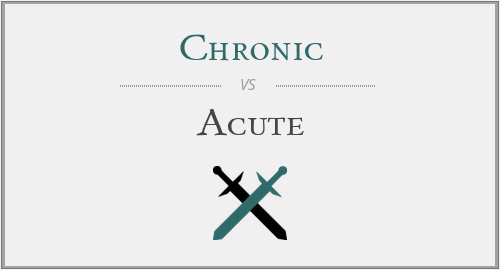Chronic vs. Acute: Navigating Medical Terminology
Understanding the differences between "chronic" and "acute" involves recognizing variations in medical terminology. This article aims to clarify the distinctions between "chronic" and "acute," shedding light on their meanings, applications, and appropriate usage in different medical contexts.
Correct Usage:
Chronic:
"Chronic" is an adjective used to describe medical conditions or diseases that persist over a long period. Chronic conditions are ongoing and may last for months or even a lifetime. They often require ongoing management and may not have a definitive cure.
Acute:
"Acute" is an adjective used to describe medical conditions or diseases that have a sudden onset and are typically of short duration. Acute conditions are severe and may require immediate medical attention. They often have a rapid onset and may resolve with appropriate treatment.
Meanings and Applications:
Chronic:
Use "chronic" when referring to conditions that are persistent, lasting over an extended period. Chronic conditions often necessitate long-term management and may impact a person's quality of life over an extended duration.
Acute:
Use "acute" when describing conditions that have a sudden and severe onset, requiring prompt medical attention. Acute conditions are often time-limited, and their symptoms can develop rapidly. They may resolve with appropriate and timely treatment.

Examples:
Correct: Diabetes is a chronic condition that requires ongoing management.
Correct: The patient was admitted to the emergency room for treatment of an acute respiratory infection.
Contextual Considerations:
Consider the duration and severity of the medical condition when choosing between "chronic" and "acute." "Chronic" refers to long-lasting conditions, while "acute" indicates sudden and severe conditions that require immediate attention.
Conclusion:
Navigating the distinctions between "chronic" and "acute" involves understanding their specific applications in the medical field. Whether discussing long-lasting conditions or sudden, severe illnesses, using the appropriate term enhances precision and clarity in medical communication.




Have a discussion about this article with the community:
Report Comment
We're doing our best to make sure our content is useful, accurate and safe.
If by any chance you spot an inappropriate comment while navigating through our website please use this form to let us know, and we'll take care of it shortly.
Attachment
You need to be logged in to favorite.
Log In